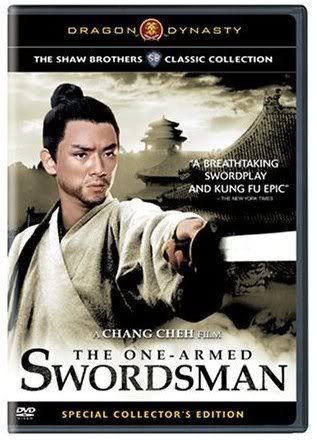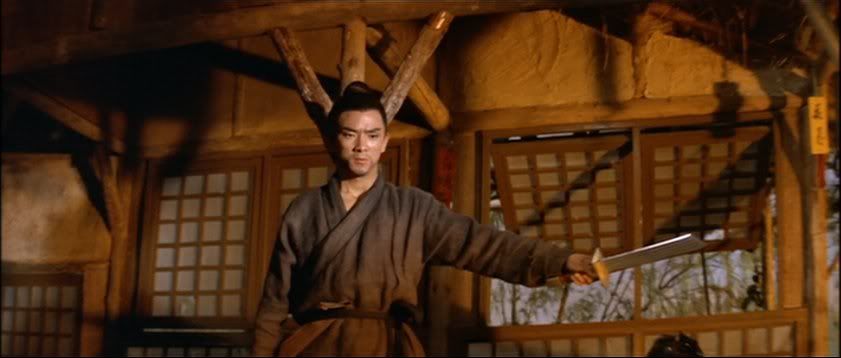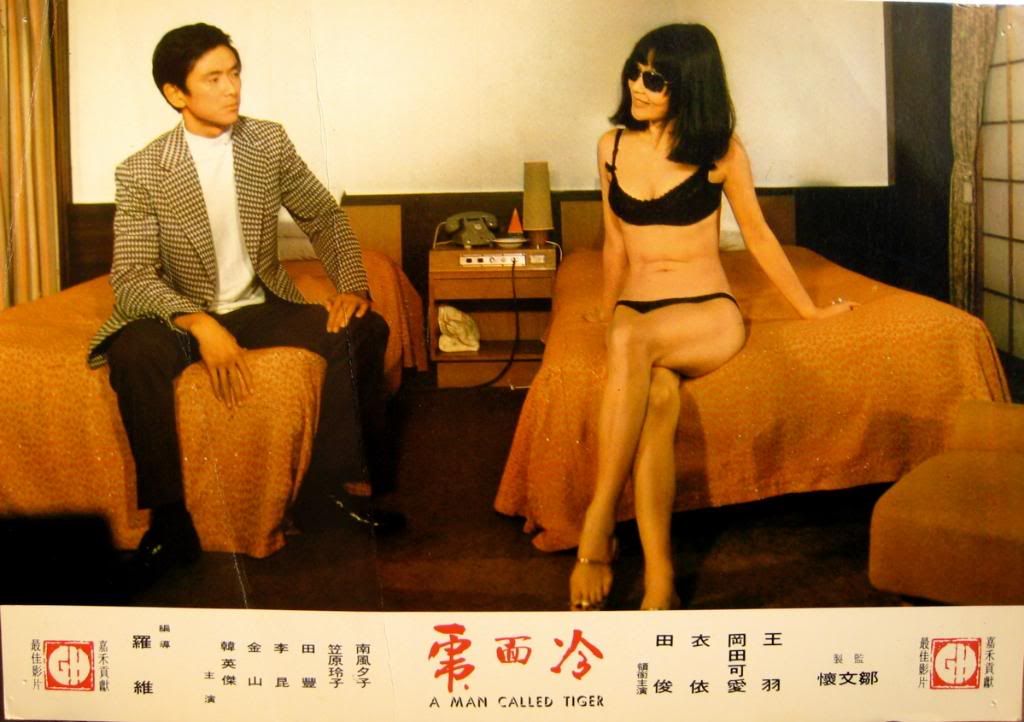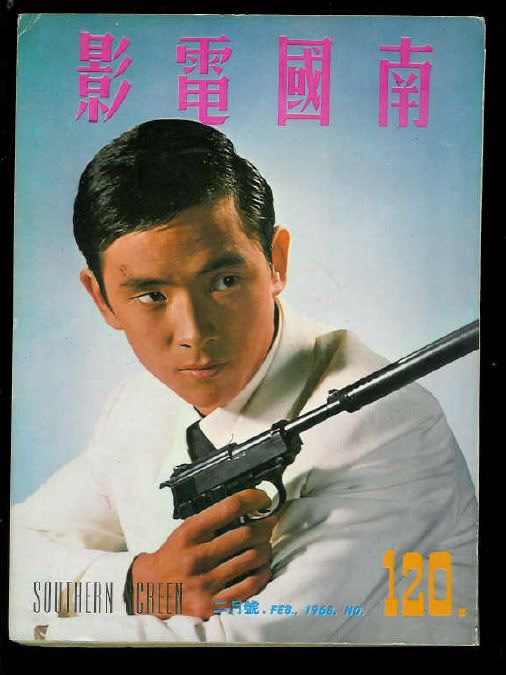I've finally started to make my way through the huge stack of unwatched DVD's I've accumulated. I'm not going to attempt to review or analyze the films in question (because let's face it, you can find better informed stuff just about anywhere on the 'net - I suggest
Todd Alcott's insightful blog for a start). Instead, I'm just going to blather on whatever topics they inspire.

First up is
One-Armed Swordsman, a classic martial arts epic starring Jimmy Wang Yu. I've never much cared for Wang Yu's work. I find him stiff and uncharismatic and a pretty poor martial artist - at least on screen. Off-screen, Wang Yu is much more interesting than any of his performances.
Wang Yu was a competitive swimmer who joined the Shaw Brothers acting school in the early 1960’s. Naturally athletic and capable of doing his own stunts, Wang was cast in a variety of action hero roles (including the Shaw-Nikkatsu James Bond knock-off,
Asia-Pol, above) before landing the lead in Cheng Cheh’s
One-Armed Swordsman. It was this role that would catapult Wang Yu to stardom.
Wang's character in
OAS is a rugged, unshaven rebel, a sword-swinging James Dean, a one-armed Brando. He is the son of a servant, a poor boy on a scholarship to a rich boy’s school, treated with contempt by his colleagues and the master’s daughter. The hero seems to have little patience for them in return, or for the traditions that force him to acknowledge them as superiors. By the end of the film, Wang Yu overcomes both his social and physical handicaps through innovation and hard work, and passes over the snooty rich girl for the nice gal from the block.
One-Armed Swordsman struck a chord with Hong Kong audiences and became a huge hit, followed by many sequels and a raft of imitators.

It’s hard to over-estimate the cultural impact of
One-Armed Swordsman. It was the bridge between the old style of wu xia film and the modern kung fu movie. Wu xia films had typically been fables set in an idealized martial world populated by handsome, noble, and usually noble-born swordsmen. Kung fu films were usually far grittier and bloodier, showcasing working-class heroes who, if they expected to beat the baddie in the final reel, would have to earn victory through rigourous effort (typically via a training montage). While
OAS is set in a wu xia world, its protagonist is the prototype for the blue collar kung fu heroes that followed.
Off screen, Wang Yu lived up to this rebellious image. The drinking and brawling were tolerated; the womanizing and illicit affairs much less so. He did end up marrying one of his conquests, a famous HK actress named Lin Tsui, but not before the scandal of the affair and the shame of divorce proceedings drove her husband to suicide. Lin and Wang would themselves divorce amidst rumors of wife-beating six years later. Wang’s second wife was an airline stewardess; when she began conducting her own affair, Wang Yu infamously interrupted the couple’s rendezvous with reporters and police in tow (adultery being a crime in Taiwan at the time).
Wang Yu's defiant nature extended to his professional life as well. Chafing under the control of the Shaws, Wang broke from the studio in a bid to gain more control over his films and the profits they generated. His first movie after leaving Shaw Brothers was
One-Armed Boxer for Golden Harvest, a role that combined the gimmicks from his two most successful films,
One-Armed Swordsman and
The Chinese Boxer (the latter often cited as the first "true" kung fu movie). The film was a box-office success, but Wang's actions had consequences. He was sued for breaking his contract with Shaw Brothers, and was barred from working in Hong Kong as a result of the settlement. Wang upped stakes to Taiwan.

In his
Hong Kong Action Cinema, Bey Logan suggests that many Shaw actors and stuntmen joined up with the Triads in order to supplement the meager salaries the studio paid out. Whether or not this was true for Wang Yu – he came from a well-to-do family and did not have to support himself with his Shaw earnings – it’s pretty much an open secret that he was “connected”. His (alleged) mob ties (allegedly) only strengthened during his years in Taiwan. This is borne out by the fact that Wang Yu was pretty much the "go-to guy" for HK actors having trouble with the mob.
The best known example of this is when Wang Yu helped out a burgeoning superstar named Jackie Chan. As he details in his biography, Chan had found himself under the thumb of producer/director Lo Wei, who was determined to turn the young actor into a carbon copy of another former protege, Bruce Lee. After a series of flops, Lo had taken to loaning Chan out to other production companies. Free of Lo Wei's influence, Chan managed to assert creative control over his films and the result was box office gold. Finding himself suddenly in demand, Chan tried to exercise the buy-out clause in his contract to accept an offer from Golden Harvest, but Lo wasn't about to let a second superstar slip from his grasp. The producer called in some Triad buddies to "persuade" Chan to stay with Lo, and things got pretty tense pretty fast. Chan's manager asked Wang Yu to broker a settlement between Lo, the Sun Yi On Triad, and Golden Harvest. The first meeting didn't go too well - the police were called in to break up the fight - but a compromise was finally reached. To this day, Jackie Chan credits Wang Yu with saving not only his career but his life.
In 1981, Wang Yu found himself in court facing a murder charge. Info on this incident is hard to come by, at least in English, so I don't know if it was related to Wang's Triad activities or his penchant for picking fights in bars. The fact that the charge was dropped due to lack of evidence doesn't really point one way or the other. In any case, in an interview included on Dragon Dynasty's DVD of
One-Armed Swordsman, Wang cites the affair as a wake-up call that got him to turn his life around.
Unfortunately, Wang Yu's Triad ties (allegedly) waxed as his box office appeal waned. His Taiwanese films lacked the gloss and budget of the Shaw studios' releases, and Wang's screen fighting skills simply weren't up to the standards set by Bruce Lee and those that followed in his wake. And, as Jackie Chan said, audiences really weren't interested in seeing Wang Yu with two arms. His attempts at breaking into the Western film industry with the Bondian
The Man From Hong Kong (co-starring former 007 George Lazenby) and the WWII actioner
Attack Force Z (as a baddie opposite a young Mel Gibson) didn't fare much better. According to scuttlebutt, the cast and crew on
Man From Hong Kong found Wang to be temperamental and difficult to work with, which helped stall out any further overseas work.
In 1982, Wang decided to try a new direction with a comeback vehicle called
Fantasy Mission Force. He called in a debt to have Jackie Chan appear in the film, a bizarre, incoherent "comedy" that did nothing to help Wang's career or that of anyone else involved (including Taiwanese film legend Brigitte Lin and singer/TV star Adam Cheng). Wang gave it another shot eight years later with
Island on Fire, a gritty crime drama co-starring Chan, Sammo Hung, Tony Leung Ka-Fai, and Andy Lau - apparently, a lot of people owed Wang Yu favors.
Island was publicized as an attempt to raise money to build a new headquarters for the Hong Kong Directors Guild, but rumor has it that it was really to help the director pay back a heavy cash debt to the triads. The Guild HQ was never built; let's hope the director cleared accounts with the gangsters.
Aside from these two comeback attempts, Wang made only a handful of cameos and guest appearances in film and television during the 80's and 90's (though he did tally a few producer credits as well). He pretty much retired from the industry after that and has kept a low profile for the most part.
He did make a public appearance in late 2007 as one of the hundreds of mourners appearing at a
top Taiwanese triad leader's funeral. Right around this time, Wang made an incredible statement to the Taiwanese press, claiming that the Kuomintang had asked him to assassinate a political dissident who had moved to the United States. Wang said that he had to turn down the KMT because he couldn't get his orders in writing, which caused him to doubt the legality of the assignment.
Let's put this into context; it's as if Richard Nixon had asked Charles Bronson to do some wetwork for the CIA. If it were any other actor making the claim I'd dismiss it out of hand. But for Jimmy Wang Yu, it's just another incident in a life as colorful as anything essayed on the silver screen.
 BIBLIOGRAPHYBOOKSFrom Bruce Lee to Ninja: Martial Arts Movies
BIBLIOGRAPHYBOOKSFrom Bruce Lee to Ninja: Martial Arts Movies (Richard Meyers, Amy Harlip, & Karen Palmer, 1985)
Hong Kong Action Cinema (Bey Logan, 1995)
I Am Jackie Chan (Jackie Chan, 1998)
Kung Fu: Cinema of Vengeance (Verina Glaessner, 1974)
FILMSFantasy Mission Force (1982)
Island on Fire (1991)
A Man Called Tiger: Modern-day crime thriller featuring Wang beating up lots of gangsters. My brother was impressed by the streetfighting in the film, but I just don't see it. The film is only available on VCD and a handful of YouTube clips, like this one.
Master of the Flying Guillotine (1976): This sequel to Wang's
One-Armed Boxer is also a follow-up to the Shaws'
The Flying Guilllotine. As in One-Armed Boxer, Wang faces off against an international smorgasboard of lethal fighters - including an Indian with abilities that will seem darn familiar to Street Fighter fans, and a blind senior citizen with a deadly beanie. The special edition DVD from Pathfinder is very nice, with a commentary track and other extras that are suprising to see in a release of a low-budget kung fu flick.
One-Armed Swordsman (1967)
Zatoichi vs. the One-Armed Swordsman (1971): Language and cultural barriers lead to a tragic misunderstanding when two Asian film icons meet. This is my personal favorite Wang Yu film, and it's widely regarded as his best screen work. I especially love how Wang's chi-powered superleaps, so common in kung fu flicks,
freaks the yakuzas' shit out!
Two flicks I haven't watched but really wanted to for this article were
Beach of the War Gods and
The Man From Hong Kong. I've just put in an order for the new Australian release of the latter. I still have to track down a good copy of
Beach, which is infamous as one of the bloodiest kung fu films ever and a movie that will convince you that Wang Yu really, really, really hates the Japanese.
WEBWikiPedia:
Jimmy Wang YuBBC News:
Hundreds mourn Taiwan gang bossTaipei Times:
Prosecutors launch investigation into Jimmy Wang 'murder contract' caseJimmy Wang Yu's MySpace Page! (He still lists street fighting as an interest!)






